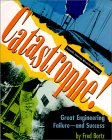As promised in last week’s blog, our spring roundup of science books continues with three books (or four, depending on how you count them) about catastrophes.
It is a topic that is important in my own writing history. My third book  Catastrophe! Great Engineering Failure–and Success (1995) was a Selector’s Choice on the National Science Teachers Association list of best science trade books for children. Its theme was about how engineers learn from failures, and its chapters included many spectacular events where things went disastrously wrong. One of those events is described in great detail in
Catastrophe! Great Engineering Failure–and Success (1995) was a Selector’s Choice on the National Science Teachers Association list of best science trade books for children. Its theme was about how engineers learn from failures, and its chapters included many spectacular events where things went disastrously wrong. One of those events is described in great detail in  Chernobyl: The History of a Nuclear Catastrophe by Harvard Professor of Ukranian History Serhii Plokhy.
Chernobyl: The History of a Nuclear Catastrophe by Harvard Professor of Ukranian History Serhii Plokhy.
The detail and breadth of this book will make it the definitive account of the tragedy for many years. It is also a cautionary tale for today. Although it is inconceivable that the risky technology and the failures of judgment that led to that particular explosion and spread of nuclear fuel and fission products over a huge area would be permitted today, Plokhy warns that the political conditions that led to it remain a threat. The dust jacket text describes it this way. “Today the risk of another Chernobyl looms as nuclear energy falls into the hands of authoritarian regimes in the developing world, where struggling economies and an alarming lack of expertise collide with outsized political ambitions based on nuclear capability.”
It is hard to argue that point when we are barely seven years past Japan’s Fukushima triple meltdown, which I wrote about in the Junior Library Guild 2012 Young Adult selection  Meltdown! The Nuclear Disaster in Japan and Our Energy Future. In retrospect, it is clear that errors in oversight, even in an advanced technological democracy like modern Japan, were as much a political failure as a technological one.
Meltdown! The Nuclear Disaster in Japan and Our Energy Future. In retrospect, it is clear that errors in oversight, even in an advanced technological democracy like modern Japan, were as much a political failure as a technological one.
As the disaster was beginning to unfold, the Japanese government was reporting that despite the record-breaking earthquake and tsunami that swamped the Fukushima Dai’ichi site, the country was facing “No immediate danger.” That statement, which could not have been farther from the truth, is the title of the  first of two volumes, totaling more than 1200 pages, that National Book Award novelist and critically acclaimed nonfiction author William T. Vollmann calls “Carbon Ideologies.”
first of two volumes, totaling more than 1200 pages, that National Book Award novelist and critically acclaimed nonfiction author William T. Vollmann calls “Carbon Ideologies.”
In that volume, which focuses on nuclear power, plus the second one entitled  No Good Alternative about fossil fuels, Vollmann argues, pessimistically, that human politics makes it nearly impossible to reverse climate change. I am sure that many critics will take him to task on his conclusions, but his extensive research makes it difficult to argue that he is as ideological as the people currently in charge of the political decisions that will shape our energy future.
No Good Alternative about fossil fuels, Vollmann argues, pessimistically, that human politics makes it nearly impossible to reverse climate change. I am sure that many critics will take him to task on his conclusions, but his extensive research makes it difficult to argue that he is as ideological as the people currently in charge of the political decisions that will shape our energy future.
In case the future where global warming looms as a threat to our security and civilization is not scary enough for you, consider a worldwide health emergency instead. Reid Wilson, national correspondent for The Hill newspaper in Washington DC, describes the urgency of  Epidemic: Ebola and the Global Scramble to Prevent the Next Killer Epidemic. Unlike Vollmann, Wilson strikes a more hopeful tone. Despite everything that can go wrong in politics, including when ideologues muddle the science that should guide their decisions, urgent responses can avert a crisis. Still, the question remains: Will we act wisely the next time?
Epidemic: Ebola and the Global Scramble to Prevent the Next Killer Epidemic. Unlike Vollmann, Wilson strikes a more hopeful tone. Despite everything that can go wrong in politics, including when ideologues muddle the science that should guide their decisions, urgent responses can avert a crisis. Still, the question remains: Will we act wisely the next time?
Blogger and reviewer Fred Bortz is the author of numerous science books for young readers.
A request from the blogger:
Please let me know you appreciated this posting by adding a comment or sending an email with your thoughts to [email protected] . Many thanks!
